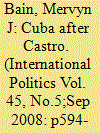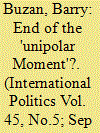|
|
|
Sort Order |
|
|
|
Items / Page
|
|
|
|
|
|
|
| Srl | Item |
| 1 |
ID:
082931


|
|
|
|
|
| Publication |
2008.
|
| Summary/Abstract |
This paper critically examines the different ways that analysts and policy-makers have assessed the future shape of the Cuban regime following the future passing of its long-time revolutionary leader, Fidel Castro. Certainly, from a social science perspective, the future of Cuba after Fidel Castro is open. On the other hand, different, often mutually inconsistent scenarios for regime transition suggest that Cuba's future is over-determined. Both features of social reality - openness and over-determination - create space for visions, ideologies, strategies, and other normative interventions designed to impose a particular cognitive and political order on social reality. While social science should try to include such 'subjective factors' in its objective account, it must maintain a critical distance from the normative closure and hopeful predictions that ideologies and strategies of necessity imply. Based on an analytical distinction between relatively stable systems and rapidly changing systems, this paper identifies and goes on to discuss the major systems of primary relevance for Cuba's future.
|
|
|
|
|
|
|
|
|
|
|
|
|
|
|
|
| 2 |
ID:
082930


|
|
|
|
|
| Publication |
2008.
|
| Summary/Abstract |
The focus of this article is the relationship that developed between Russia and Cuba in the years since the disintegration of the Soviet Union. The reasons for both the deterioration in relations in the early 1990s and their improvement from the middle of the decade will be analysed. A variety of different causes are important for both but significantly the improvement in the relationship has taken place when globally the neoliberal economic model has been pre-eminent. This article will argue that chief among the reasons for closer Russian-Cuban relations has been the neoliberal economic model.
|
|
|
|
|
|
|
|
|
|
|
|
|
|
|
|
| 3 |
ID:
082928


|
|
|
|
|
| Publication |
2008.
|
| Summary/Abstract |
This paper argues that while the US might retain the desire, and up to a point the material capacity to lead, it is likely to find itself increasingly without followers. Partly this is because the US is less accepted as a model, partly it is because of differences on specific policies, and partly it is because of the changing foundations of legitimacy in international society. The big issues likely to dominate the international agenda in the coming years are more likely to decrease than to increase the willingness of others to follow the US. The waning of US leadership is not just a consequence of the particular incompetence of the Bush administration over the last 8 years, though that has surely amplified the problem. It reflects deeper changes that make global hegemony by any single power, or even by the West collectively, decreasingly legitimate.
|
|
|
|
|
|
|
|
|
|
|
|
|
|
|
|
| 4 |
ID:
082929


|
|
|
|
|
| Publication |
2008.
|
| Summary/Abstract |
Is the United States inevitably in decline? After the foreign policy controversies of the George W. Bush years, a new consensus declares the end of American dominion. In this article this conventional wisdom is challenged. The US constitutes an 'exceptional empire' and, despite the recent rise of powers such as the EU, China and India, the four foundations of this distinctive empire remain robust. First, the US still exhibits global predominance in hard power. Second, the essentially unipolar international order shaped by Washington remains resilient. Third, neither the rise of 'anti-Americanism' nor the alleged decline of US 'soft power' endanger its predominance. Fourth, the US political class is committed to preserving American primacy after Bush. No other power is currently in range of competing with the US for global influence. Moreover, each faces powerful internal weaknesses and external threats at least as significant as those facing the US. America's global predominance in hard and soft power do not translate into omnipotence. Nor does predominance promise an error-free foreign policy. The US nonetheless continues to defy both history and theory
|
|
|
|
|
|
|
|
|
|
|
|
|
|
|
|
| 5 |
ID:
082927


|
|
|
|
|
| Publication |
2008.
|
| Summary/Abstract |
This essay reflects on the period of Putin's presidency in a broader context of general Russian history and maintains that Putin's Bonapartist mission has been historically predetermined. By characterizing the contemporary stage in Russia's political evolution as the Russian Thermidor, the author explains, from this viewpoint, the revanchist policy of Russia towards the West, as well as in the post-Soviet area, and predicts an inevitable drive to 'regather' the severed historic Russian lands, including territorial claims to the 'newly independent states,' as the ultimate resolution of the 'Russian Question.' Explicating the 'shock therapy' transition to capitalism as a robbery of state assets by the Russian plutocracy, the author argues in favor of the Chinese transition model and concludes that, in spite of all these detriments, the resurgence of Russia as a great power is ensured by its intellectual, economic and military potential, boosted by the highest oil and gas prices in history.
|
|
|
|
|
|
|
|
|
|
|
|
|
|
|
|
|
|
|
|
|